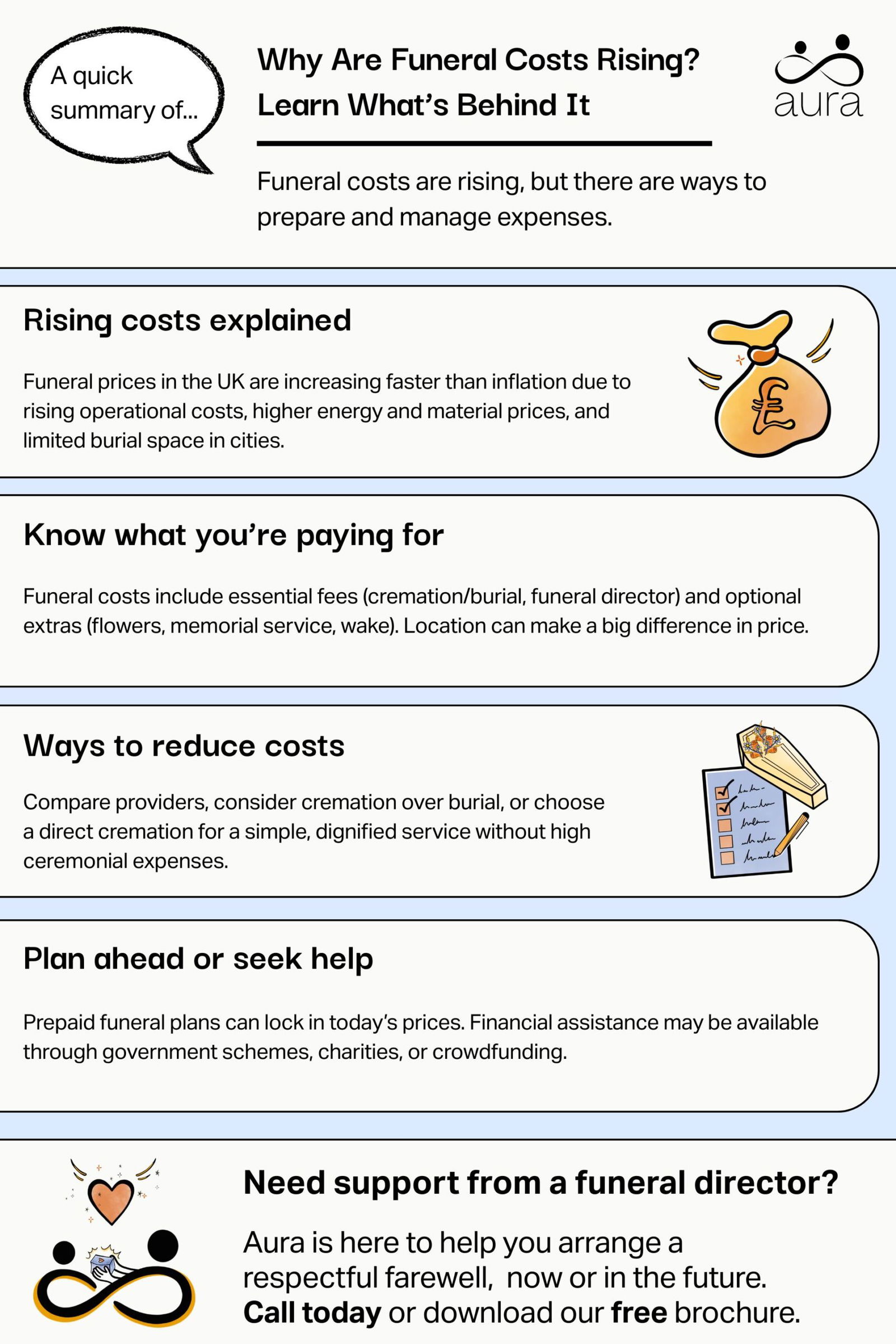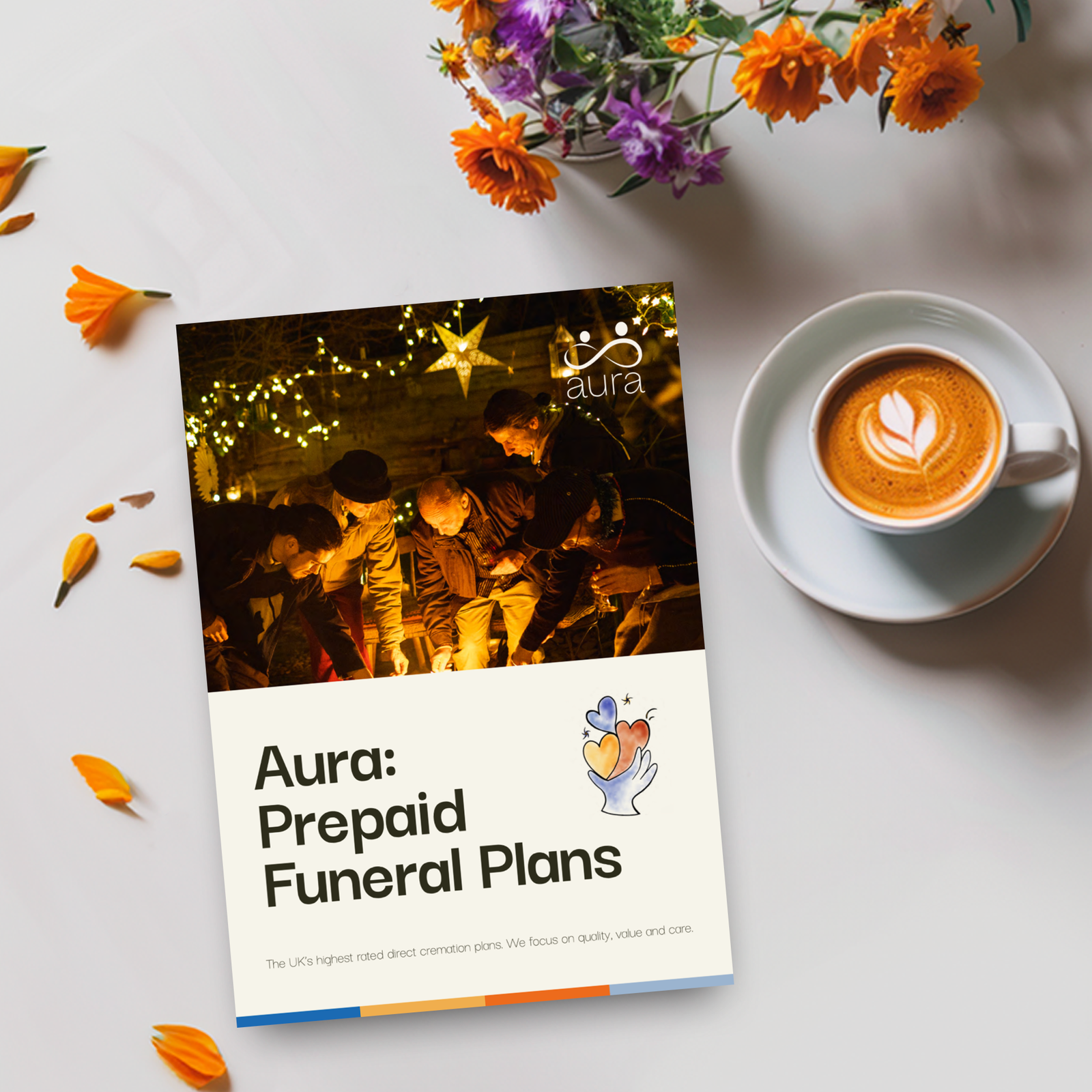





Written by Adam McIlroy.
11 minute read
Article reviewed by Steven Barratt, Founder of Save Funeral Costs on August 14, 2025.
With the experience of families up and down the UK (as well as several industry studies) confirming that the funeral prices are rising, the cost involved with arranging a funeral is often one of the first things we find ourselves thinking about. It’s already hard enough to lose someone we love without also needing to worry about how we are going to pay for their send off. But why are funeral costs rising? This article aims to answer that question, and several others which are connected to it.
We’d also just like to acknowledge the potential difficulty of your situation at the outset; we know that if you’ve found us here, you could be going through a tough time at the moment. Aura is the top-rated ‘Cremation Services’ provider on Trustpilot, with a score of 4.9/5 stars. We offer our funeral services to those seeking a direct cremation now, as well those looking to the future, with our prepaid funeral plans.
Key takeaways:

Providing an overview of funeral costs in the UK can help you get a better sense of what your money can cover when planning a funeral.
There are a few trusted voices in the funeral industry that regularly share financial data, helping families make more informed choices. SunLife, for example, releases an annual Cost of Dying report, which tracks price trends and offers averages for cremations and burials. They also split funeral costs into ‘mandatory’ and ‘optional’ expenses.
According to the report, the national average total cost of a funeral in the UK is now £5,140. This marks a 4.7% rise compared to the previous year, when the cost was £3,953. Legal & General also reviews funeral pricing each year and currently estimates the UK average cremation cost at £4,431, while a burial now typically costs around £5,894.
Both SunLife and Legal & General highlight a useful distinction between mandatory costs (such as funeral director fees and the cremation or burial itself) and additional extras (like funeral flowers, a memorial service, or a wake).
Sunlife predicts a 126% increase in how much a funeral costs over a 20-year period, which is significantly higher than the rate of inflation (72%) during the same period. But why are funeral costs rising?
It’s important to bear in mind that, just like every other area of industry, the funeral industry has been impacted by increased operational costs in recent years. Inflation has had a big impact on things like the price of coffin manufacturing, and on fuel / energy costs, which influences transportation and cremation costs.
It’s also the case that, in the centres of our larger cities, cemetery plot-space is becoming fewer and farther between, which increases the demand in relation to supply. The price naturally increases as a result. In fact, in the UK, particularly with burial costs, there can be quite a large disparity in final price: according to Legal & General, the average price for a burial in the Greater London is ~£9,000, where in Wales or the East Midlands, you could pay ~£5,000; a potential regional disparity of ~£4,000. This is one example of how location affects funeral costs.
Global geopolitical factors have done a lot of damage to the economies of the world. The Russian invasion of Ukraine has impacted the price of food and energy, which increases inflation and drives up global manufacturing prices. This all has a direct and indirect impact on the mandatory and additional costs of funeral arranging.

Funeral costs tend to be increasing year-on-year at a faster rate than inflation generally over the same period.
Sunlife have explained that funeral prices are approaching an all-time high. That’s because, since they began making their Cost of Dying reports in 2004, funeral prices have increased by 126%. When compared to the 72% by which inflation has increased in the same period, it shows that funeral prices have been increasing year on year at a significantly faster rate.
According to Legal & General, the average ‘cost of dying’ in the UK in 2014 was £3,616. By 2034, they anticipate an average price of £6,733. This would make the percentage increase in price between 2014 and 2034 ~86%. Naturally, these projections are based on how prices have been increasing historically, and past financial developments don’t necessarily indicate future performance. Nevertheless, with more global security the pressures on the world’s trade system and economies could lessen, seeing a corresponding reduction in inflation and costs.
‘Why are funeral costs rising?’ and ‘Why do funerals cost so much?’ are often some of the first questions we ask ourselves when someone dies, particularly when faced with paying for their funeral ourselves.
Different providers of funeral services will structure their funeral or direct cremation prices in different ways, opting to include certain elements in the final pricing, or not. If you’re looking for a direct cremation in the near future, you can get a better sense of how each provider arranges their pricing by comparing direct cremation providers and their costs against one another.
For instance, some might charge extra for medical-device removal prior to cremation, where others like Aura, will cover this in the quoted price. Providers, depending on the type of funeral, may offer extra services, such as embalming for a final viewing, or the option of an attended ceremony. You can see what is included in Aura’s unattended direct cremation offering for those arranging a funeral in the short-term, below.
There are often unexpected costs, or costs which appear hidden when arranging a funeral. For instance, the sheer amount of paperwork involved with organising a funeral often takes people by surprise, and, depending on how you intend to pay (for example, with over-50s life insurance), you may need multiple copies of the Death Certificate in order to make claims. The government charges a small fee per copy, which is something many people don’t foresee.
There are different ways to manage funeral costs, you are worried about why funeral costs are rising, and how their increase can be afforded. Families also often ask who is responsible for funeral costs when a loved one dies. In most cases, this can be covered through the person’s estate, government support, a prepaid funeral plan, or by contributions from family members.
It’s essential to compare the different options on the market to see which provider can give you the best price for the kind of funeral that you’re looking for. It can also be a wise idea to weigh up cremations vs burial, given that the former tends to be significantly less expensive. Direct cremation, generally, is the cheapest form of funeral on the market, offering families the option to take care of the practical matters in a dignified and streamlined manner without having to face financial ruin. They can then, if they would like, add a celebration of life for the person who has died at a later date, which can be as extravagant or as low-key as appropriate.
In looking to the future for your own funeral, you may want to think about organising a prepaid funeral plan. A funeral plan allows you to lock in today’s prices, thereby beating the trend of rising funeral prices. If you were to buy an Aura funeral plan, we would place your money into our FSCS-protected, independently managed trust, where it would stay safe from the potential impact of inflation. When the time comes for your funeral, we would withdraw all we’d need to pay for everything from our trust, with nothing left to pay for your family at the time.
The UK government could provide support to eligible families who may be struggling to pay funeral costs. The Department of Work and Pensions (DWP) has two schemes designed for those in need: the Bereavement Support Payment and the Funeral Expenses Payment, which allow you to claim funeral costs. You could also access the bank or building society account of your loved one, paying their funeral costs directly from any money they have saved there. This can be organised through the Grant of Probate scheme.
Of course, buying a funeral plan or applying for government support may not be available or appropriate for everyone. Charities and the local community can also provide financial and bereavement support.
Quaker Social Action can signpost towards charities providing financial support, as can Cruse Bereavement Support. You may also wish to consider crowdfunding as a way of sourcing financial support for a funeral. Websites like JustGiving or GoFundMe allow you to post a fundraising request online, which can be shared across social media, such as when you are announcing the death of a friend or family member. Many families can raise all or part of what they need to pay for a funeral through these channels.
At Aura, we are proud of our compassion, patience and kindness in our service. Our wonderful Aura Angel team are the champions of our approach, and they’ll be there to guide you or your family through the difficult experience of funeral arranging. They’re not only experts in funeral coordination, but can lend you an ear if you need to talk about what’s on your mind. We’re there for you on the phone, whenever you’re ready.
Aura is a family-run company, founded by Paul Jameson in 2019 after following his motor-neurone-disease diagnosis. He set up Aura wanting to help families in the UK to benefit from his confrontation with his own mortality, and his experience with end-of-life planning. He runs the company today alongside his son, David (our CEO), and a family friend called Ben (our COO). We strive to provide a service that never compromises on quality, and never drops below what Paul would expect for his own family. Why not download our funeral plan brochure today, and learn how you can give peace of mind to the ones you love by paying for your funeral in advance.

If you’d like to know more about how to plan a cremation with Aura, our brochure is a helpful place to begin.
Our funeral plans are a helpful way to put everything in place for you or someone else.
When the time comes, our experienced team will be here to guide you through each step, offering support and advice whenever you need it.
To find out more about how our plans work, what’s included, and our story, you can request a brochure by clicking the link below. We will then send you a copy by email or First Class post—whichever you prefer.
Some overlooked expenses include:
Extra copies of the Death Certificate
Transport or urgent collection fees
Embalming or medical-device removal
Memorial extras like flowers or venue hire
To manage funeral costs, consider:
Comparing providers and plans
Choosing direct cremation
Using government support (like Bereavement Support Payment)
Exploring prepaid funeral plans to lock in today’s prices
You may be eligible for government schemes like the Funeral Expenses Payment. Charities such as Quaker Social Action or Cruse Bereavement Support can offer advice and financial help. Some families also turn to crowdfunding platforms like GoFundMe or JustGiving.